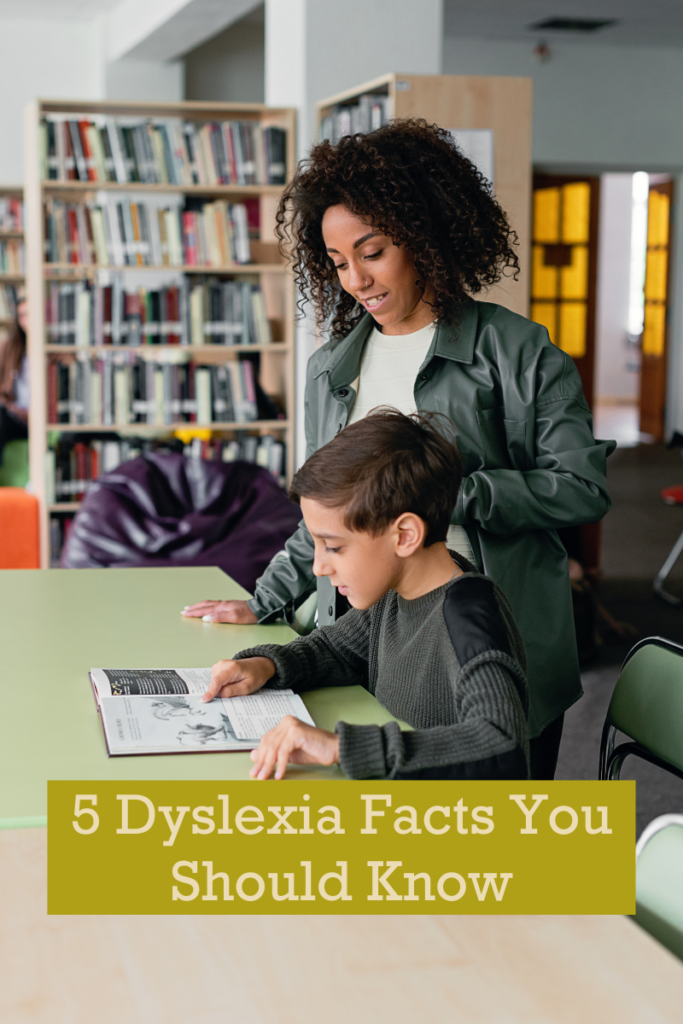You might know that dyslexia is a learning difference that affects a student’s ability to learn to read.
But there are many other surprising dyslexia facts you might not know.
And when you understand what dyslexia is and how it affects students, you can better advocate for your learner and/or the dyslexic learners in your community. That’s why in this blog post, you’ll learn 5 dyslexia facts that might surprise you!
But first, a quick review on the definition of dyslexia.

Dyslexia is broadly defined as a difficulty in learning to read. It is a learning difference that most often presents as a gap between a child’s potential and performance in the areas of reading, spelling, and writing.
Dyslexia is commonly identified during elementary school years as difficulties with reading and writing appear. Nonetheless, some children may not receive a diagnosis until later in life, may be diagnosed in adulthood, or never at all.
Now that you have an understanding of what this learning difference is, check out the surprising dyslexia facts below.
Dyslexia affects up to 20% of the population and represents 80–90% of all those with learning disabilities, according to The Yale Center for Dyslexia and Creativity.
Additionally, it occurs in people of all backgrounds and intellectual levels, according to the International Dyslexia Association.
Bottom line: it’s common!
There’s a good chance that if you have dyslexia, so will your children.
There is a strong genetic component to neurodivergence, including learning differences such as dyslexia. “As many as 49 percent of parents of kids with dyslexia also have it. And about 40 percent of siblings will also struggle with reading,” according to understood.org.
According to CDC guidelines, a learning disability or disorder is identified when a child struggles in one or more learning areas, regardless of their overall intelligence or motivation.
In fact, to receive a diagnosis such as dyslexia, a student typically needs to have an average to above-average IQ.
With proper resources, guidance, and a conducive learning atmosphere, dyslexic students can and will develop proficient reading skills.
According to The International Dyslexia Association, an estimated 30% of those with dyslexia have coexisting Attention Deficit/Hyperactivity Disorder (ADHD). It’s important to note, however, that while these two conditions often occur together, one does not cause another.
Here are other conditions that often co-occur with dyslexia:
Parents and even teachers often assume that since their learner is not reading and writing their letters backwards, a dyslexia diagnosis is off the table.
However, letter reversal isn’t the only sign of dyslexia.
If your child has dyslexia, they may:
Early identification and remediation is key, so if you suspect your child has challenges with reading, reach out to your child’s teacher, school counselor, or a psychologist who can diagnose dyslexia as soon as possible.
Roberts Academy is Georgia’s only transitional school for students with dyslexia outside of Metro Atlanta.
The Academy teaches a comprehensive curriculum designed for grades 2-5 using the Orton-Gillingham approach, an evidence-based teaching method proven to help students with dyslexia.The Academy will open in August of 2024 and is now accepting applications; learn more here.
When you arm yourself with the facts, you can be a better advocate for students with dyslexia.
Remember, Dyslexia …
Roberts Academy is ready to support your dyslexic learner. Click here to apply.
Roberts Academy is now accepting applications for enrollment. Classes will begin in August 2024.